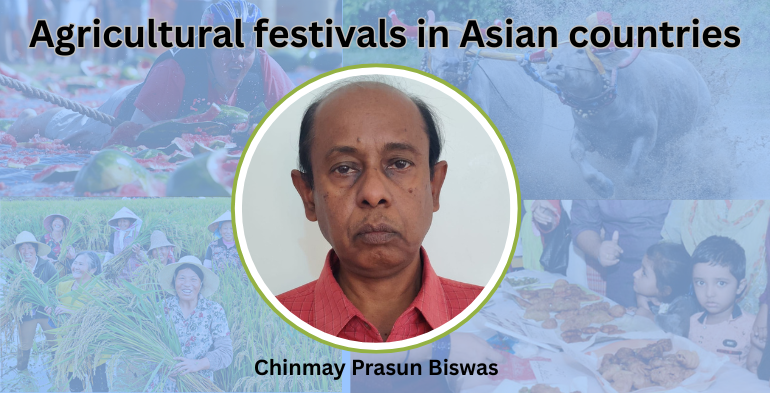
Chinmay Prasun Biswas
It is frequently said that at present we are staying in the age of fourth industrial revolution though the matter is not at all clear to almost all. It is simply a popular dialogue. However, no question about it but it is beyond doubt that not industry but agriculture feeds world people. There are thousands of food processing industries in this world but agriculture provides their raw materials. There is a close relationship between agriculture and festival all over the world. Away from Bangladesh, many agricultural festivals are observed in different countries of Asia.
In India the main agricultural festivals are Pongal, Bihu, Makar Sankranti, Lohri, Onam and Baisakhi. These festivals are primarily celebrated to express joy at harvest, gratitude towards agricultural resources and nature. The main objective is to praying for a good yield and celebrating the prosperity of the farming community. Pongalis or Pongal, a four-day mid-January harvest festival, is held mainly in Tamil Nadu. This ancient festival has is closely related to harvesting of crops like rice, sugarcane and turmeric. For four days its names are –Bhogi Pongal, Thai Pongal, Mattu Pongal and Kanuum Pongal.
Bihu is an important agricultural festival of Assam where joy and gratitude are expressed after the harvest. Lohri is a popular harvest festival in North-West India, normally celebrated in January. Onum is another popular Indian agricultural festival in southern state of Kerala. It is a 10-day harvest festival held in August-September. During this festival people decorate their homes with colourful flowers and rangoli. Many delicious dishes are prepared at home. These traditional dishes are served on palm leaves. Baisakhi is a harvest festival in North India, primarily celebrated to observe the joy of bringing in the Rabi crops. Similar to Bangladesh, the Nabanna festival is also observed in West Bengal and Assam.
Through these festivals farmers express gratitude towards nature, God, and hard work for abundance of crops. Farmers celebrate the joy of bringing in their main crops. These festivals hold economic and social significance for the farming community. Prayers are offered to God for good rainfall and a good yield and respect is shown towards nature.
Agriculture of China, a land of 150 crore population, is highly developed. Farmer and harvest festival, celebrated in mid-autumn, is the main agricultural festival in China. This festival displays diligence, initiative and creativity of Chinese farmers, highlights the achievements of rural development and reflects China's agricultural heritage. By 2023, China's per capita grain output reached 493 kilograms which is more than world average.
Apple is an important agricultural product of China. During September in Baishui county, northwest China's Shaanxi province, apple orchard branches are full with red fruits, providing farmers the joy of a good harvest. Baishui apples are well-known for sweet, juicy and crisp taste. In recent years local farmers have effectively adopted scientific planting procedure and strict quality control to maintain its quality and popularity in market. After apple picking a colourful festival is celebrated with traditional dance and song.
The Philippines is also an agriculturally developed country. Rice is a staple food in Filipino culture and agriculture is an important part of the country's economy. Different agricultural and harvest-related festivals are celebrated in the Philippines to honour the contributions of farmers to nation and to show respect towards nature. Agawan Festival is the main one. It is held annually on 15th May in Sariaya, Quezon Province in honour of Saint Isidore the Laborer (patron saint of agriculture) to express gratitude towards harvest and good crops. The locals observe it as a religious and cultural festival also.
Besides this, Watermelon Festival is a main agricultural festival in the Philippines. This event features technologies and varieties of watermelon and honeydew as alternative crops for farmers. At least 28 varieties of watermelon and four varieties of melon and honeydew are displayed during the festival. Agricultural companies participate to promote early-maturing and high-yielding smart crop varieties. Initially, a handful of farmers planted a new variety of watermelon though others were doubtful about it. But when harvest season came a huge number of buyers were eager to purchase those sweet and juicy watermelons. Many buyers from distant places, even from Metro Manila, come to negotiate with watermelon farmers ensuring a ready market even ahead of the harvest. To avoid oversupply in market the Provincial Agriculture Office encourages farmers to organise themselves into an association or cooperative as an access to bigger markets.
Vietnam is one of the world's leading rice producing and exporting countries. Agriculture is an important part of Vietnamese economy. Many people in the country are engaged in farming. In Vietnam, modern agricultural technologies, such as drum seeders and leaf colour charts, are being used to bring innovation in agricultural sector which helps to increase production.
Hanoi Agricultural Festival is an agricultural and festival in Vietnam. This festival has no particular schedule. It was held in September in 2022, in April in 2023 and in March in 2025. This open-air festival, also a grand fair, aims at boosting product promotion, facilitating network activities and increasing sales for cooperative members. More than 1,000 products are displayed in this festival. It provides businessmen and producers an effective opportunity to promote their brands, connect with modern distribution and retail networks and expand market range for agricultural products from Hanoi to other regions of Vietnam.
Thailand is another major rice-producing country in the world. A huge portion of Thai workforce is engaged in this sector. Among different agricultural festivals in Thailand the main one is the traditional buffalo race, usually held after the harvest in every rainy season. This competition tests the buffalo's efficiency in farming and is a tradition in rural areas. Moreover, Songkran or the water festival is celebrated to mark the beginning of new agricultural year. People splash water on each other which symbolises cleanliness and new beginning. Thousands of youths, both male and female, participate in this festival with guns aiming at one another but those are not actual guns used for firing or hunting. In fact, those are plastic water guns used for merriment in the festival which is celebrated from centre to periphery.
-The writer is a former Commissioner of Taxes
























